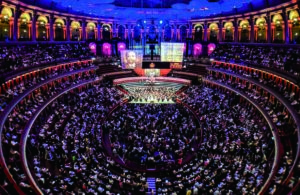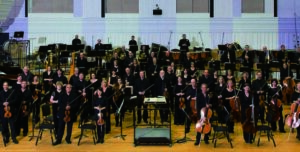사형 선고받은 BBC 프롬스
영국의 대표 클래식 음악 축제가 당면한 문제와 그 원인

로열 앨버트 홀 ©BBC Proms 2017


올여름 더프롬스(Proms)는 우리가 알던 영국 오케스트라로서는 마지막 축제가 될 예정이다.
브렉시트나 코로나19, 우크라이나 전쟁, 인플레이션, 천연가스 공급 축소 등의 정세 때문이 아니다. 이 상황은 반세기 동안이나 이어진 부실 경영, 이에 더해 안전한 곳에 앉아 다가올 폭풍우를 모르쇠로 일관하던 무지한 이들의 정신적 나태함이 만들어낸 산물이다. 어쨌든, 축제는 이제 끝났다.
사형 선고는 BBC 방송 사장인 팀 데이비(1967~)의 입에서 나왔다. 그는 더프롬스의 대부분을 방영하는 BBC 4 채널 송출을 종료하고, 런던과 맨체스터, 스코틀랜드, 웨일즈에 위치한 BBC 산하의 6개 교향악단에 “‘가능한’ 대체 수입원을 찾으라”고 종용했다. 진실성 없는 이 제안은 블라디미르 푸틴 대통령의 특별 조치와 궤를 같이한다.
BBC 음악 및 라디오 부문을 총괄했던 데이비는 ‘가능한’ 곳이 없다는 사실을 잘 알고 있을 것이다. 공공 및 민간 자원은 메마른지 오래고, BBC 심포니 오케스트라는 ‘The Last Night of the Proms’를 ‘the GazProm BBC Last Night of the Proms’(GazProm, 러시아 천연가스 회사)로 바꾸지 않는 이상 가치가 없다. 이를 조사 위원회가 절대 허가해줄 리도 없지만 말이다. 데이비는 BBC 오케스트라 미래가 텅 비었다는 걸 안다. 그가 할 수 있는 일은 천천히 약을 풀면서 비난을 퍼뜨리는 것이다. 좋은 때는 지나가 버렸다.
결속되지 못한 지역 오케스트라
“이런 일이 일어날 줄 몰랐다”고 말할 수 있는 사람은 아무도 없다. 60년 전 런던의 권력을 한 손에 쥔 변호사, 아널드 굿맨(1913~1995)은 베를린과 빈을 대적하기 위해 고만고만한 오케스트라 세 개를 하나로 합쳐 대형 교향악단을 만들 것을 제안했다. 당시 그는 영국 예술위원회(Art Council) 의장이자 두 수상의 법률고문이었고, 대부분의 일을 자기 뜻대로 행할 수 있었다. 하지만 이 문제만큼은 ‘다른 오케스트라와 합치느니 차라리 영국 여왕의 강아지들에게 짓밟히는 쪽을 선택할’ 오케스트라의 충실하고 오래된 후원자들의 뜻을 관철할 수 없었다. 대형 교향악단은 탄생하지 못했고, 그렇게 침체는 시작되었다.
1980년대, BBC에서는 일부 지역 오케스트라를 단계적으로 축소하려고 시도했다. 그러자 음악가들의 전국적인 파업이 이어졌고, 이는 프롬스를 몇 주간 중단시켰다. 주제넘지 않았던 BBC의 음악 부문 책임자는 자리에서 물러나야 했다. 이 일 이후로 BBC 음악 부문에서는 이 문제에 대적하는 사람이 아무도 없었다. 오케스트라와 방송국 일반 사업부 사이에는 거리가 꽤 멀었던지라, BBC의 오케스트라들이 영국 땅에서 한가로운 시간을 보내는 와중에도 BBC 드라마국은 뮌헨과 프라하의 앙상블에게 음악 녹음을 의뢰해야 했다.
이 체제를 결속할 수 있는 인물이 필요했지만, 자금이 분할되어 있어 시스템 자체가 복잡했다. BBC는 소속 오케스트라에 급료를 주었고, 예술위원회가 나머지 부서에 정부 자금으로 급료를 주었다. 이에 따라 불합리한 불평등이 발생했다. 런던에는 현재 세 개의 BBC 소속 오케스트라, 네 개의 예술위원회 소속 오케스트라, 두 개의 오페라 하우스 소속 오케스트라로 총 아홉 개의 대형 오케스트라가 있다. 맨체스터에는 BBC 필하모닉과 예술위원회의 지원을 받는 할레 관현악단, 맨체스터 카메라타와 더불어 20분 거리에 로열 리버풀 고향악단이 있다. 하지만 리즈·셰필드·노팅엄·사우샘프턴·브리스톨 같은 도시에는 오케스트라가 단 하나도 없다. 말도 안 된다고? 설명하기에도 입이 아프다.
제국 시대의 속 좁은 군주들처럼, BBC와 예술위원회는 겹치는 부문에 대한 협력을 오랜 시간 거부해왔다.
예술위원회 위원장 알란 데비가 BBC 클래식 음악 부문을 맡게 되면서 희망이 보였지만, 오래가지 못했다. 그는 융통성이 넘치는 잉글랜드 내전의 기회주의자처럼, 한쪽의 요구사항을 충족시킨 뒤 다른 쪽도 공략했다. BBC는 소속 오케스트라로 방송하기를 선호했다. 한번은 브로드캐스팅 하우스(BBC 본사) 로비에서 한 지역 오케스트라 매니저가 내게 “라디오3에 공연 문의하려면 대체 누구한테 가서 물어봐야 합니까?”라며 울부짖기도 했다.
영국은 ‘음악 없는 땅’이 되고 말 것인가
금요일 밤에 가족이 함께 방 안에 둘러앉아 라디오를 청취하는 일은 없다. 다른 나라에서는 오케스트라들이 이미 이 환경에 적응했다. 독일은 통일 이후 오케스트라를 180개에서 130개로 감축했다. 물론 슈투트가르트에서 동등한 위치의 방송교향악단과 지역 오케스트라가 서로 양보하지 않아 잡음이 있었지만, 이는 매우 예외적인 사례였다.
북유럽은 지역 내 경쟁을 장려했다. 스톡홀름과 코펜하겐에서는 방송교향악단이 로열 필하모닉보다 더 뛰어나다고 여겨질 정도였다. 스웨덴 지휘자 헤르베르트 블롬슈테트는 최근 ‘방송교향악단이 오페라적 산만함에 물들지 않은 순수한 형태의 음악을 연주한다’는 말을 들었다. 그가 이끄는 덴마크 방송교향악단(덴마크 국립교향악단)은 양조회사인 칼스버그(Carlsberg), 투보그(Tuborg)로부터 맥주가 아닌 스트라디바리우스 악기를 받는다. 하지만 영국 방송국은, BBC의 망상 가득한 선전하에서 소속 오케스트라를 경직시키기만 했다. 이제 BBC 앞에 놓인 것은 한 치 앞을 내다볼 수도, 방어할 수단도 없는 거대한 폭풍우다. 외부 요인도 위기를 가속하는 데 한몫했다. 적대적인 보리스 존슨 정부는 대중세에 해당하는 BBC 수신료가 즐거움을 찾아 넷플릭스(Netflix), 스포티파이(Spotify), 포르노 사이트로 몰려드는 젊은 시청자에게 맞지 않는다는 이유로, 수신료 인상을 거부해왔다.
팀 데이비(BBC 사장)는 전통적인 방식대로, 고급문화를 배제해 젊은 층을 공략하려는 고연봉 감독들과 가까이 지냈다. 사기를 꺾는 굴욕 속에서 새로운 정권하의 클래식 음악계는 BBC 팝 음악 부문 위원장이자 의심할 여지 없이 스쳐 지나갈 인물, 로나 클라크의 비호 아래 놓여있다. 그녀의 명언 중 하나를 소개해보자면 다음과 같다. “음악 팬들이 오랜 시간 동안 집중할 수 없는 게 아닙니다. 사람들의 머릿속을 차지하려는 경쟁이 엄청나게 심화된 거죠.” 2022년 여름, BBC가 처한 상황이자 오케스트라에는 가망이 없는 현실이다.
최악의 순간이라고 말하기도 아직 이르다. 충성스러운 공연 애호가들은 코로나19 이후 공연장으로 복귀하지 못하고 있다. 런던의 한 오케스트라는 이번 봄, 6주 동안 단 하루도 공연이 없었다. 브렉시트 이후, 유럽 대륙에 도움을 받는 것도 어려워졌다. BBC 오케스트라만 망각의 길을 걷고 있는 것이 아니다. 영국은 십 년 안에 다시금 ‘음악이 없는 땅(Das Land ohne Musik)’으로 전락할 수도 있다. 그러니 부디 프롬스를 즐기시라. 축제가 사라지기 전에 말이다.
번역 evener
노먼 레브레히트 칼럼의 영어 원문을 함께 제공합니다
본 원고는 본지의 편집 방향과 일치하지 않을 수 있습니다
This summer’s BBC Proms will be the last festival of British orchestras as we know them. This is not a consequence of Brexit, Covid, Ukraine, inflation, the gas squeeze or any other headline cause. It is the legacy of half a century of mismanagement and mental indolence on the part of safe-seat suits who turned a Nelsonian blind eye to the gathering storm. Well, it’s over now.
The death sentence was delivered by the BBC’s director general Tim Davie, in a statement terminating BBC4 which televises most of the Proms and urging the BBC’s six orchestras in London, Manchester, Scotland and Wales to look for ‘alternative sources of income where possible.’ The insincerity of that suggestion is on a par with Vladimir Putin’s special measures. Davie, a former boss of BBC music and radio, knows full well there is no where possible. Public and private cash for concerts has dried up and BBC orchestras have no brand to offer except the big one – the GazProm BBC Last Night of the Proms – which will never get past regulators. Davie knows the what the future holds for his orchestras: there is none. All he can do is soften the pill and spread the blame. The party’s over. No-one can truthfully say that they did not see this coming. Sixty years ago Arnold Goodman, London’s most powerful lawyer, proposed that three struggling orchestras should merge into a super-philharmonic to rival Berlin and Vienna. Goodman, who was head of the Arts Council and legal adviser to two prime ministers, got his way on most things. But here he could not fight his way past royal and most ancient patrons of orchestras who would no more blends their bands than stamp on the Queen’s corgis. The superorchestra never happened and stagnation set in.
In 1980 the BBC made an attempt to wind down some of its regional orchestras. The ensuing national strike by musicians shut down the Proms for several weeks and cost the unassuming head of music his career. No BBC music man has confronted the dragon ever since. So peripheral are orchestras to the corporation’s general business that the drama department commissions film tracks from ensembles in Munich and Prague while BBC orchestras sit idle at home. There ought to be someone in the system who can join up the dots, but the system is complicated by split funding. The BBC pays its own orchestras while the Arts Council gives Government dosh to the rest. The result is a preposterous map of inequality. London has nine big orchestras -three BBC, four Arts Council and two opera houses. Manchester has the BBC Philharmonic, plus the AC-backed Halle and Camerata, with a Liverpool Philharmonic twenty minutes down the road. Meanwhile cities the size of Leeds, Sheffield, Nottingham, Southampton and Bristol have no orchestra at all. Absurd? I couldn’t possibly comment. Like petty princelings under the Raj, the BBC and Arts Council have long refused to discuss cross-sector cooperation. Hopes rose when an Arts Council bureaucrat, Alan Davey, became head of the BBC’s classical music, but not for long. Like the ideologically flexible Vicar of Bray in the English civil war, Davey served first one camp, then the other. The BBC favours its own orchestras on air. In the lobby of Broadcasting House I have been accosted by a regional orchestra manager, crying, ‘Who do I have to fuck round here to get one of my concerts on Radio 3?’
In other countries, orchestras have adapting to a changed environment where families no longer gather around a sitting-room radio for the Friday night concert. Germany, post-unification, has cut down its orchestras from 180 to 130, and with very little fuss except in Stuttgart where the radio and town orchestras were of equal quality and neither wanted to budge. The Scandinavians promoted local competition to an extent where, in Stockholm and Copenhagen, the radio orchestra is considered superior to the royal philharmonic. The Swedish conductor Herbert Blomstedt was heard musing recently that radio orchestras offered a purer form of music making, unpolluted by operatic distractions. The Danish radio orchestra, which he led, was originally furnished by the brewers Carlsberg and Tuborg with Stradivarius instruments, no small beer. British broadcasting, however, allowed its orchestras to ossify, shielded by delusional blasts of BBC propaganda. The BBC now faces a perfect storm, clueless and unprotected. External factors have accelerated the crisis. A hostile Boris Johnson Government has refused to increase the BBC licence fee, arguing that this universal tax is unjustified as young viewers surge to Netflix, Spotify and Pornhub for their entertainment needs. Tim Davie, in time-honoured fashion, has ringed himself with a phalanx of high-paid directors who have been tasked with draining high culture to favour youth fads. Among the more withering humiliations, classical music under the new regime has been brought beneath the aegis of the Commissioner Of Pop, Lorna Clarke, a person of unimpeachable ephemerality. Let me offer one of Ms Clarke’s obiter dicta: ‘It’s not that music fans can’t give you their attention for a long time, it’s the fact that there’s a massive amount of competition around who wants their headspace.’ That is where the BBC finds itself in the summer of 2022, in a mindset where orchestras stand no chance.
It could not come at a worse moment. Once-loyal concertgoers have failed to return since Covid. One London orchestra went six weeks this spring without a single working day in its diary. European engagements have tightened post-Brexit. The BBC orchestras are not alone in facing oblivion. Britain, in a decade, could end up again as Das Land ohne Musik. Enjoy the Proms, while they last.
글 노먼 레브레히트
영국의 음악·문화 평론가이자 소설가. ‘텔레그래프’지, ‘스탠더즈’지 등 여러 매체에 기고해왔으며, 지금 이 순간에도 자신의 블로그(www.slippedisc.com)를 통해 음악계 뉴스를 발 빠르게 전한다







